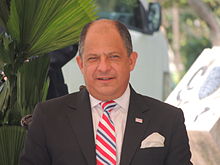Luis Guillermo Solís
| Luis Guillermo Solís | |
|---|---|
 |
|
| President of Costa Rica | |
|
Assumed office 8 May 2014 |
|
| Vice President |
First Helio Fallas Venegas Second Ana Helena Chacón Echeverría |
| Preceded by | Laura Chinchilla |
| Personal details | |
| Born |
25 April 1958 San José, Costa Rica |
| Political party |
National Liberation Party (Before 2005) Citizens' Action Party (2009–present) |
| Spouse(s) | Nancy Richards (1987–2006) |
| Domestic partner | Mercedes Peñas Domingo (2006–Present) |
| Children | 6 (5 with Richards) |
| Alma mater |
University of Costa Rica Tulane University University of Michigan, Ann Arbor |
| Religion | Roman Catholicism |
Luis Guillermo Solís Rivera (born 25 April 1958) is a Costa Rican politician who has been President of Costa Rica since 2014. He is a member of the center-left Citizens' Action Party (PAC). Solís led the field in the 2014 presidential election, and he was effectively handed the presidency after the runner-up in the first round, San José mayor Johnny Araya Monge, ceased active campaigning. Solís has a long academic and political career, culminating in his election as the first President of Costa Rica to be a member of the PAC.
Solís was born in San José, Costa Rica to Vivienne Rivera Allen, an educator, and Freddy Solís Avendaño, an uneducated shoemaker. Both his parents lived in Turrialba, and as such many residents consider him Turrialban. His family has Afro-Caribbean and Chinese roots, coming from Jamaica to Costa Rica in the early 1900s. Solís grew up in San Pedro de Montes de Oca and Curridabat, neighborhoods of San José. He attended Methodist High School in San José, where he was president of the student body, before studying history at the University of Costa Rica, where he earned a degree with academic honors in 1979. He earned a master's degree in Latin American Studies at Tulane University in New Orleans.
Solís has held various academic and consulting positions. Between 1981 and 1987, he was an associate professor at the University of Costa Rica. In addition, he was a Fulbright Scholar at the University of Michigan from 1983 to 1985. During this time, Solís worked with the Arias administration and eventually became director of the Center for Peace and Reconciliation (CPR for its Spanish initials). From 1992 to 1995, Solís worked with the Academic Council of the United Nations System. Starting in 1999, Solís worked for Florida International University as coordinator in the Center for the Administration of Justice and as a researcher for the Latin American and Caribbean Center, where he analyzed political and social events in Latin America.
...
Wikipedia
